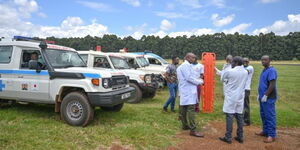A fresh study has revealed two simple yet powerful ways for patients battling an advanced stage of colon cancer to improve their chances of survival, particularly after surgery.
In the new study by the American Society of Clinical Oncology (ASCO), researchers have found that by adopting a less inflammatory diet, patients slash their chances of succumbing to the disease by more than 50 per cent.
A phase 3 clinical trial involving 1,625 patients who had undergone surgery revealed interesting findings on how a simple tweak in diet can impact survival outcomes of colon cancer in its latter stages.
Using detailed surveys, the patients, who had an average age of 61, were tracked over time for their diet and physical activity.
The researchers used a special tool dubbed the Empirical Dietary Inflammatory Pattern (EDIP) to carefully evaluate the inflammatory potential of each patient's diet, and the results were quite insightful.
Notably, diets high in inflammation-promoting foods, including red meat, processed meats, sugary drinks, and refined grains, scored higher on the chronic inflammation scale.
On the other hand, diets rich in anti-inflammatory foods such as leafy greens, dark yellow vegetables, coffee, and tea had a relatively lower score.
As far as physical activity is concerned, patients who engaged in physical activity as simple as regular walks throughout the week also greatly boosted their chances of survival when this was combined with a diet consisting of foods which ranked lower on the chronic inflammation scale.
In other words, the research found that patients who combined both a low-inflammatory diet with regular exercise had a 63 per cent lower risk of death than those who did neither.
One worrying statistic, which also put things into perspective, was that patients on pro-inflammatory diets were more likely to be the younger generation. More ladies than men also fell into this category, according to the study by ASCO.
Dig deeper: Colon cancer is the third most diagnosed cancer and the second leading cause of cancer-related deaths globally. The primary treatment for stage III cases of this type of cancer mainly entails surgery, but statistics show that the cancer returns in up to 35 per cent of patients within the first five years after surgery.
The chronic systemic inflammation caused by poor diet and a sedentary lifestyle is believed to increase the risk of developing this type of cancer and the chances of it returning after surgery.












